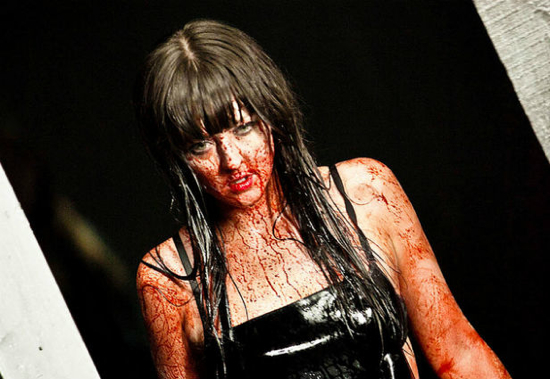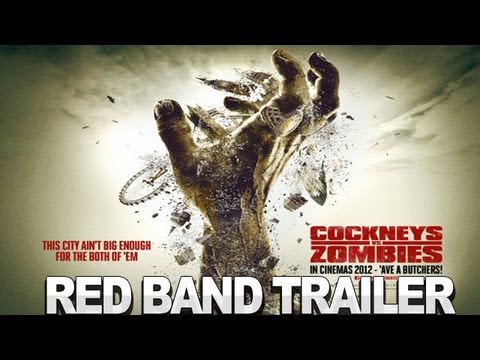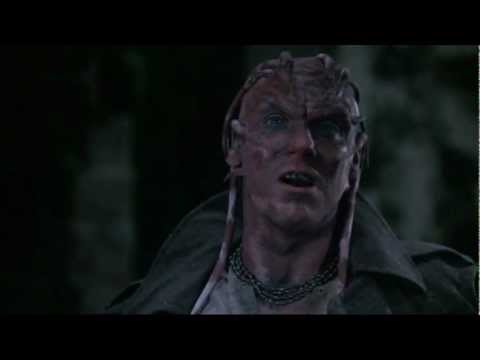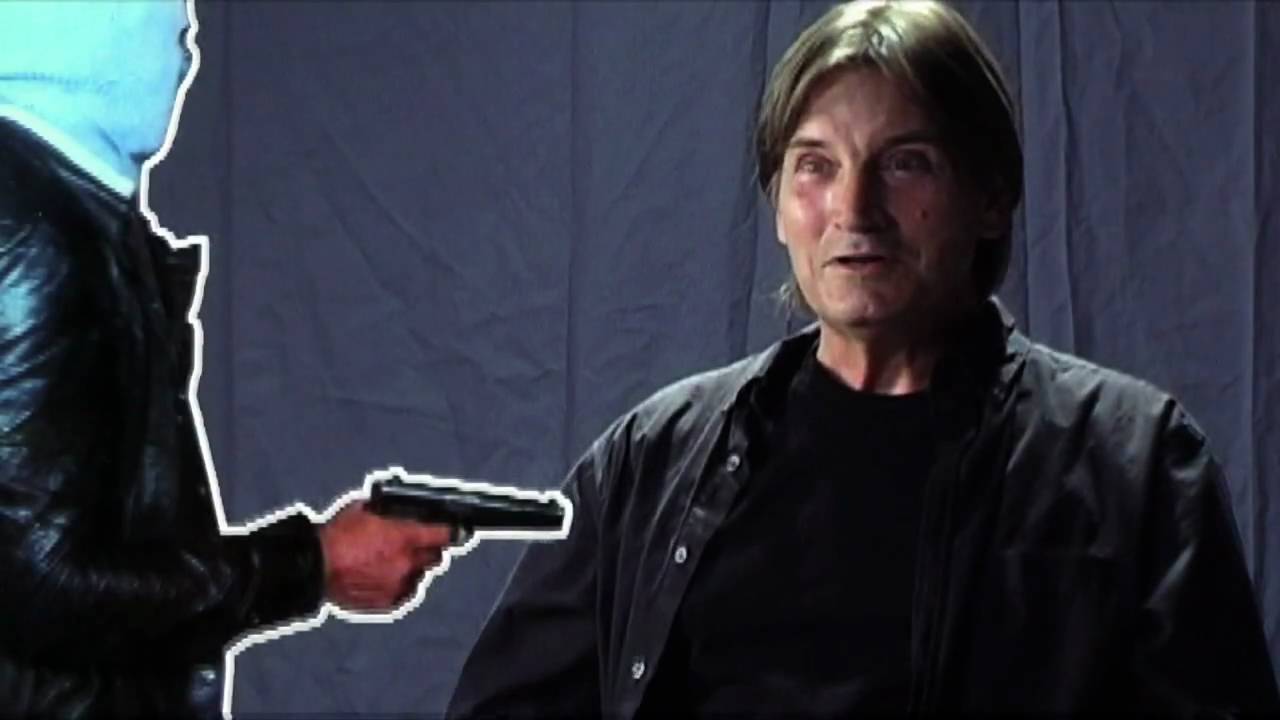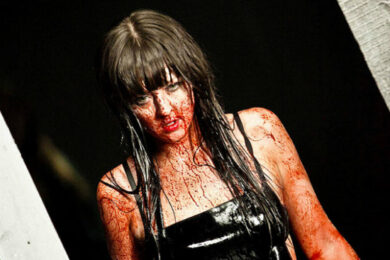To say it’s a pilgrimage for some isn’t to overstate FrightFest’s importance. For 13 years now the festival’s organisers have spent months in preparation, sifting through and programming an ever-growing number of films, so that more than 1300 fans can spend five days in a darkened room – their eyes fixated upon the vast silver screen before them, eager for the triumphs and disasters that shine upon it.
Pleasing so many folks at once is no easy feat. There are bound to be some stinkers thrown in the mix. But many don’t attend for the surefire pleasures, but rather to "soak up the atmosphere": the camaraderie, the bustling chaos of the Empire Cinema’s foyer, the minor celeb spotting, the shared bitching and laughter with friends, old and new alike.
The first film is on at 10am and by midday you’re supping your first pint, reflecting on whatever has just thrilled or offended you and strategizing just how you will proceed with your day. Can you do two or three films in a row? If there are two shit ones back-to-back, you definitely need a break. But film three has good buzz, so perhaps skip film two – certain that since no one has heard of it, it’s ok to miss – and you’re fully prepared to settle in for films three and four. You want to see the selections, but equally you want to chat and enjoy your time. It is, after all, a bank holiday weekend. You do, however, run the risk of missing a true gem. We all want the gem, the as-yet-unsung, unseen masterpiece, Some years deliver. Some, sadly, don’t. But either way, the anticipation is there. So for all the work the organisers put into programming, equally the punters stress and debate.
The movies chosen for FrightFest often baffle, such as this year’s opener The Seasoning House, the tale of a deaf and mute girl, trapped in a war-torn Serbian brothel, forced into helping the sadistic master and tending to his harem of heroin-dazed unfortunates. A nasty and unsettling film, it paints Serbian men in the unkindest light possible, intent on sickeningly brutal rape. You hope for and expect a higher budget, glossier version of the Christina Lindberg-starring 1974 classic Thriller – A Cruel Picture, aka They Call Her One Eye. The Seasoning House is British special effects master Paul Hyett’s directorial debut. His lack of confidence as a storyteller, and unsureness of exactly what he is making, leads us through a series of unnecessary and confusing flashbacks. It’s an uncomfortable mix of high tension drama teetering on the edge of torture porn, yet never meshing the two or deciding which way to go. The Seasoning House loses steam in the third act as our heroine flees the single location-based premise and scatters our attention into the surrounding woods, with a final twist that has all the impact of a leaf hitting the ground. Not a win by any stretch, though it shows that with some experience and confidence in himself, Hyett has the wherewithal to become a contender. His next film could very well come barreling at us like an 18-wheeler.
Other films are pure crowd pleasers, such as Matthias Hoene’s does-what-it-says-on-the-tin Cockneys Vs Zombies, a lighthearted romp through an undead-infested East End. These are the middling features which you hope will at least do what you expect, another potential example being Outpost II: Black Sun. Sadly, the second instalment in Steve Barker’s Nazi zombie trilogy just potters along through its 101 minutes, never picking up steam or engaging you – and yes, normally Nazi zombie films are surefire hits.
Dragging yourself to Leicester Square for a 10am screening of a nearly three-hour feature, with advance warnings of quality issues, isn’t one’s normal idea of a good time. When that feature is the long-awaited, much-rumoured extended cut of Clive Barker’s Nightbreed, itself a film with serious problems, you really struggle to get out of bed. Many of us remember Nightbreed fondly from the early ’90s. Barker’s rambling monster tale based on his novel Cabal was good, but not great. It’s mostly remembered for poor characters, a stunning menagerie of monsters that live beneath Midian Cemetery, and its main saving grace in the form of David Cronenberg’s portrayal of Decker, a pure Barker serial killer. Further let down by shoddy sets, the cityscapes are matte paintings and the exterior shots at the cemetery look like the cardboard tombstones are about to topple over and hit the stage wall. Revisiting it a few months ago, I found that Nightbreed does not stand the test of time – there are certainly moments, but not quite enough to save it.
The initial 1990 release was delayed due to reshoots, before finally being trimmed by nearly an hour, to bring the running time down to a less butt-numbing 108 minutes. Word was that Barker was under pressure to trim back his typical insanity, as seen in Hellraiser. Twenty years later and after a fair bit of digging, dedicated fans have pieced together Nightbreed: The Cabal Cut from VHS workprints. Sitting down with the original script and re-editing the whole to factor in these murky elements alongside the standard Nightbreed sections has resulted in arguably the most complete version of Barker’s vision we are likely to see.
With a plethora of additional footage, it rewrites the tale we are familiar with to become an epic fantasy well ahead of its time, more akin to the modern fantasies spun by Guillermo del Toro than the Barker of old. The Cabal Cut corrects numerous flaws, first and foremost by fleshing out the characters. It turns Boone (Craig Sheffer) from a wooden buffoon into a confused and trapped man. His girlfriend Lori transforms from mere annoyance to a caring woman chasing the man she loves, regardless of the monster he becomes. Actress Anne Bobby’s stomping rendition of the overlooked ‘Johnny Get Angry’, in her lost nightclub scene, gives Lori all the reason in the world to follow Boone to the ends of the Earth, or below. Cronenberg’s Decker is now quite obviously the inspiration for Cillian Murphy’s Scarecrow in Christopher Nolan’s Batman trilogy. Filling out the characters goes a long way to making this a much more cohesive tale, plus the unexpected political undertones are now evidentm becoming more powerful in a post-Bush world full of fear of The Other, as American militia groups are highlighted in a prolonged "suit up to kill the bastards" montage.
Nightbreed: The Cabal Cut is a butt-numbing 2 hours 45 minutes. That, coupled with the mash-up of murky VHS quality, makes it a picture for the dedicated and curious only, but certainly worth getting out of bed for. It may or may not make it to DVD, so being able to see this at all is a special treat and one we rely on FrightFest to deliver.
For its 2009 Spring Awakening Day event, FrightFest brought Not Quite Hollywood: The Wild, Untold Story Of Ozploitation! to the UK. This documentary about Australian New Wave cinema from the 1970s and ’80s helped to make Ozploitation a recognised genre and gave films such as Turkey Shoot, Patrick and Wake In Fright the recognition they deserve on the international stage. Since then, there’s been a hunt to create its successor, a doc that would catapult a new genre to the forefront of people’s minds. Attempts were made with Machete Maidens Unleashed!, about the Filipino film industry, and American Grindhouse, about, well, American grindhouse films. But none have really managed to pull off the engaging mix of talking heads and explosive, over-the-top imagery that distinguished Not Quite Hollywood. Until, that is, Mike Malloy’s labour of love Eurocrime! burst its way onto the Empire’s huge screen. Boasting interviews with the likes of Franco Nero, Henry Silva, John Saxon, Fred Williamson and Enzo G Castellari, along with various other actors, directors and stuntmen, Eurocrime traces the genre’s roots to the American police thrillers and heist films of the ’60s, plus the decline of the Spaghetti Western genre, which set Italy up for its next foray into the machismo-filled world of the Poliziotteschi (or Eurocrime, for those of us who can’t be bothered with tongue twisters).
These slapdash, low-budget productions typically told the story of the rogue against his authorities, be it was the cop versus corrupt officials or the renegade gangster trying to get one over on his bosses. It was always us against them, a theme that rings true even now. Set against a tumultuous ’70s Italian backdrop littered with the Brigate Rosse and mafioso-corrupted politicians, these themes were ideal escapism for the country’s massive cinema-going audiences. Now, almost 40 years on, when our yearning for something not quite Hollywood drives us to dig into the past and search out cinema’s lost treasures, the Eurocrime genre is ripe for the picking. Spanning some 250 action-filled movies, with astonishing shoot-outs, car chases and fist fights, Eurocrime! the documentary is a perfect way to get a glimpse into what might be your new favourite genre, and a more than worthy successor to Not Quite Hollywood.
Three years ago FrightFest premiered Italian rock star Federico Zampaglione’s Shadow, a gorgeously shot, but otherwise fairly typical locked-in-the-basement-by-a-deranged-killer flick. This year saw his return to the big screen with Tulpa, a neo-giallo. Opening with a classically sexy bongage scene, which culminates with the masked and black-gloved assassin doing what he does best, it was off to a good start. However, as the film progressed it became painfully obvious that what’s missing are the key elements of gialli, which are style and class. Substance is generally not required here, but the results had better be slick, sexy and classy. Tulpa was lacking on all fronts. Add in the terrible dialogue and it became difficult to sit through. Remembering my two bad film rule, and having just seen the absurd Paura 3D, I left. Sadly, I missed such crowd-pleasing lines as: "No one knows anything about him, except he’s a hermaphrodite." Later likened by other festival goers to Troll 2 and The Room for its impressive levels of misguidedness, reports state that the majority of the cinema was in tears of hysterics by the closing credits – not something the producer, director and actors in attendance were entirely happy about. But still an enjoyable watch, if viewed in the correct light. Shame I missed most of it.
The horror genre has always been a stomping ground of the remake. Taking a fan favorite and reimagining or just sprucing it up for a modern audience has been going on since The Student Of Prague (1913, 1926, 1935) and Frankenstein (1910, 1931, etc). So more often than not FrightFest has at least one remake, whether it’s Fright Night or I Spit On Your Grave. Like recessive genes, they will crop up. The fans like a good moan so they continue to watch them. This year’s offering is the reinterpretation of William Lustig’s classic 1980 sleaze flick Maniac. Featuring Joe Spinell as the titular maniac – stalking girls, murdering and scalping them, before stapling their luscious locks onto the heads of his mannequins – the original Maniac is grot of the highest order, depicting a nasty, sleazy New York City at its lowest point and a tortured, sick man struggling against his inner demons.
Now, 32 years later, we see Hollywood A-lister Elijah Wood in the role of Frank the maniac. It’s an odd choice on the surface but, let’s face it, Wood’s a creepy-looking fellow, with a similar bulging eye issue to the one Spinell suffered from. This is certainly a brave role for him to take on. Director Franck Khalfoun spins Maniac in several ways. First he shifts the action from NYC to LA, but an LA we’re not familiar with – this is not the LA of movie stars, or even of Drive. It’s a darker and sleazier place, largely devoid of people, making stalking one’s victims much easier. As in Khalfoun’s 2007 film P2, the barren environment provides an overbearing sense of loneliness. Next, and more controversially, the piece is mostly shot in first-person point of view, so the viewer becomes the killer. More interestingly, we become the inner demon, driving Frank to kill. At one point he asks why we are making him do this; from there on, we are the maniac. Frank/Wood is only ever seen in reflections and photographs or via CCTV footage, save for the few times when we float out of his head.
As glossy and vibrant as it may be, Maniac 2012 is every bit as troubling and harrowing as the original. This powerful, engaging and brutal festival highlight was screened uncut at FrightFest, though is likely to see several cuts before a general UK release. Purists will cry out in opposition, but I’m not convinced that that will take away from the overall effect of a fantastic and challenging work.
From the co-writer and director of [REC], Jaume Balagueró, comes Sleep Tight, which reminds us that looking under the bed before going to sleep is never a bad idea. Barcelona apartment building doorman Cesar (Luis Tosar) occupies his nights keeping the happy-go-lucky Clara (Marta Etura) company. Not that she knows it, of course, where would the fun be in that? Nope, this unlucky tenant has been chosen by Cesar as the target of his desire, which is to wipe that cheery smile from her face. Permanently. She too must become devoid of emotion, empty and vacant. Like Pacific Heights or Single White Female, we follow Cesar as he works his wicked magic to bit by bit destroy Clara’s life and force her to live with the horrific consequences of his actions. This darker-than-Hitchcock thriller is without question one of the finest films to come out of FrightFest, and will undoubtedly leave you in a state of shocked and troubled terror, possibly curled up in a ball, crying and shaking.
With a name like FrightFest, one expects the unnerving at this festival, the unease of dread-filled suspense. Often we rely on American horror to deliver the jump scares and mini fears, as in Sinister and The Possession: expected tales full of evil-possessed children twisting, contorting and delivering the blueprinted scares. Flawlessly, but entirely foreseen. It’s in these moments that little films can overshadow the bigger budget productions; without studio heads looking out for the returns of every penny spent, risks can be taken. As is the case with Buddy Giovinazzo’s A Night Of Nightmares, which marks a shift from his typical, grittier outings such Combat Shock and Life Is Hot In Cracktown.
A Night Of Nightmares follows an internet DJ, Mark Lighthouse (Marc Senter), as he travels to meet his latest "find" Ginger (Elissa Dowling). Holed up in an isolated house working on her latest recordings, Ginger has been fending off calls from her over-interested landlord. When Mark arrives, they enjoy a pleasant evening until Ginger’s stalker makes an unexpected appearance, and suddenly the landlord’s calls take a turn for the worst. Buddy G delivers a tension-filled 85 minutes, the picture redefining itself with every twist. It’s disgusting and terrifying along the way, proving you don’t need money to scare. As with vegan food there’s less to throw in the mix, so you’d better make the most of what you’ve got. Like the best chefs, Buddy G knows this and gets the finest flavour from his ingredients.
Throughout the FrightFest premieres, be it the body modification triumph of American Mary or the sumptuous psych-out Berberian Sound Studio, one thing shines: a passion for a genre. This passion celebrates the often overlooked or hard sells, by taking chances on VHS-quality big screen premieres for the geek in us all, or allowing smaller filmmakers a place to shine and bringing them up to the status of genre hero in just a few short days. When Monday night rolls around and you’ve viewed your last film, you look at your now beaten and stained programme. Taking solace in the fact that you’ll be back next year, you share a last drink with a new friend you’ve made, one who blatantly doesn’t understand why a particular selection was so good and deserved the big screen! But that’s ok. It’s FrightFest.
Josh Saco is the maniac behind Cigarette Burns Cinema, who host regular London screenings of cult classics and choice obscurities.

